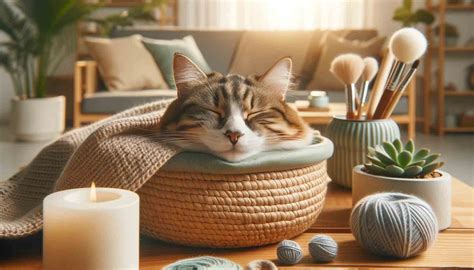Cats, our beloved feline companions, can experience anxiety and stress just like humans. While these emotions are normal in certain situations, excessive or chronic stress can lead to behavioral problems and health issues. Therefore, it is essential for pet owners to understand the causes of cat anxiety and stress and implement effective stress-relief strategies.

Causes of Cat Anxiety and Stress
Environmental Factors:
- Changes in routine
- Moving to a new home
- Loud noises or construction
- The presence of other animals
Social Factors:
- Separation anxiety
- Aggression from other cats
- Lack of socialization
- Competition for resources
Medical Problems:
- Pain or discomfort
- Illness or injury
- Cognitive decline
Personality Differences:
- Some cats are more prone to anxiety than others
- Kittens and senior cats may be more susceptible
Symptoms of Cat Anxiety and Stress
Behavioral Changes:
- Hiding or avoidance
- Aggression
- Excessive grooming or licking
- Urinating or defecating outside the litter box
- Pacing or restlessness
Physical Symptoms:
- Increased heart rate or panting
- Dilated pupils
- Loss of appetite
- Vomiting or diarrhea
Effective Stress-Relief Strategies
Environmental Modifications
- Create a safe and comfortable space for your cat
- Provide plenty of hiding places
- Use calming pheromone diffusers
- Minimize loud noises and vibrations
Socialization and Play
- Spend quality time with your cat
- Encourage play and physical activity
- Provide interactive toys
- Consider getting a companion animal
Medical Intervention
- Consult with your veterinarian if you suspect an underlying medical condition
- Consider prescription anxiety medication
- Try over-the-counter calming supplements
Holistic Approaches
- Massage or acupressure
- Bach flower remedies
- Herbal supplements
- Meditation or yoga for cats (CATyoga)
Other Tips
- Keep a regular feeding and exercise schedule
- Avoid punishment
- Use positive reinforcement for desired behaviors
- Consider a pet sitter or boarding facility for short-term stress relief
Cat Anxiety and Stress Relief: A Comparison
Behavioral Therapy VS Medication
- Behavioral therapy addresses the underlying causes of anxiety and can provide long-term results.
- Medication can quickly reduce symptoms, but it may not address the root of the problem.
Natural Remedies VS Prescription Drugs
- Natural remedies are often less expensive and have fewer side effects than prescription drugs.
- Prescription drugs are more potent and may be necessary for severe cases of anxiety.
Tables for Stress-Relief Strategies
| Environmental Modifications | Socialization and Play | Medical Intervention | Holistic Approaches |
|---|---|---|---|
| Calming pheromone diffusers | Interactive toys | Prescription anxiety medication | Massage |
| Safe hiding places | Companion animals | Over-the-counter supplements | Bach flower remedies |
| Minimize loud noises | CATyoga | Herbal supplements | Yoga for cats |
| Behavioral Therapy | Medication | Natural Remedies | Prescription Drugs |
|---|---|---|---|
| Addresses underlying causes | Quick symptom relief | Less expensive | More potent |
| Long-term results | May not address root problem | Fewer side effects | Necessary for severe cases |
FAQs
- Is cat anxiety a serious problem? Yes, chronic anxiety can lead to behavioral problems and health issues.
- What should I do if I think my cat is anxious? Consult with your veterinarian to rule out any underlying medical conditions and discuss stress-relief strategies.
- How can I prevent my cat from becoming anxious? Create a stable routine, provide plenty of hiding places, and socialize your cat from an early age.
- Is there a cure for cat anxiety? There is no one-size-fits-all cure, but with proper diagnosis and treatment, most cats can be managed to live happy and stress-free lives.
- How can I tell if my cat is stressed? Look for changes in behavior, such as hiding, pacing, increased heart rate, or loss of appetite.
- What are some natural ways to calm down a stressed cat? Try using calming pheromone diffusers, providing a safe hiding place, or playing soothing music.
Future Trends and Innovations
The field of cat anxiety and stress relief is constantly evolving. New research is uncovering the underlying mechanisms of anxiety and developing more effective treatment strategies. Future trends include:
- Personalized medicine: Tailoring stress-relief approaches to individual cats based on their unique needs.
- Technological advancements: Developing wearable devices that monitor stress levels and deliver targeted interventions.
- Integrative medicine: Combining traditional and holistic approaches to provide comprehensive stress relief.
Conclusion
Cat anxiety and stress are common challenges that can impact the well-being of our feline companions. However, by understanding the causes of stress, implementing effective stress-relief strategies, and seeking professional help when needed, pet owners can help their cats live happy and fulfilling lives.





















